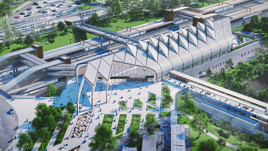The construction of HS2 Ltd’s new £370 million Interchange station, near Solihull in the West Midlands, will create up to 1,000 jobs over at least the next five years.
Newly appointed contractor Laing O’Rourke confirmed the news on September 6, when major figures from construction and politics visited the site of the project, which is still in its very early stages.
The main contractor will start work next year on the detailed design work for the extensively revised station building. The 400-acre site - within a triangle of land formed by the M42, A45 and A452 roads - is currently being prepared by Balfour Beatty VINCI ready for construction to begin in 2024.
Laing O’Rourke then has three years to complete the station, in advance of the railway opening between 2029-33.
Up to five trains per hour are planned to pass through the interchange station in both directions, with an estimated total of 175,000 seats per day,
To read the full story, see RAIL 966















Login to comment
Comments
Güntürk Üstün - 09/11/2022 00:05
The new HS2 Interchange Station will serve Solihull, Birmingham Airport and the NEC, with links to local roads and the UK motorway network, making it one of the best-connected places in the UK. The new HS2 station, to be built on the outskirts of Solihull and the NEC in the West Midlands, has become the first railway station globally to achieve the BREEAM ‘Outstanding’ certification – a measure of sustainability for new and refurbished buildings – putting it in the top 1% of buildings in the UK for eco-friendly credentials. The station has been designed to maximise views over the surrounding Arden landscape, providing a pleasant passenger experience. Its roof is designed to maximise natural daylight and capture rainwater for recycling, which will reduce the demand for electricity and water. Dr. Güntürk Üstün
Güntürk Üstün - 09/11/2022 00:11
HS2 is Britain’s new high speed rail line being built from London to the North-West, with HS2 trains linking the biggest cities in Scotland, Manchester, Birmingham and London. It is the largest infrastructure project in Europe and the most important economic and social regeneration project in decades. In the last three months, the rapid pace of HS2’s construction has seen more than 2300 people join the ‘orange army’ building HS2’s stations, viaducts, bridges and embankments, taking the current total workforce to just under 30000. The project’s record employment figure reflects the scale of major civils and early works now underway, spanning 350 sites from the southeast to the northwest. Dr. Güntürk Üstün